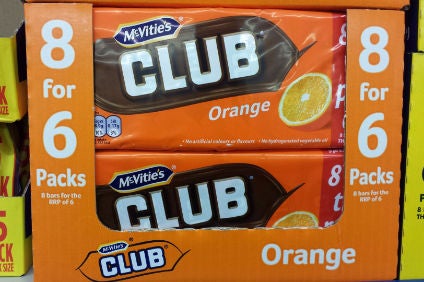
Pladis, the UK-based snacks group, has expressed confidence its local biscuits business can meet the voluntary sugar-reduction target outlined by the country’s government.
Manufacturers doing business in nine categories in the UK – including biscuits, breakfast cereals and yogurt – have been set what the Government has called a “challenge” to reduce the sugar in their products by 20% by 2020 as part of attempts to tackle rising child obesity.

Discover B2B Marketing That Performs
Combine business intelligence and editorial excellence to reach engaged professionals across 36 leading media platforms.
This week, the Government issued guidelines on how suppliers in the nine categories – groups of food said to be most consumed by children – could try to hit the voluntary target, which was first announced last summer.
Last week, UK industry body the Food and Drink Federation had warned it would “not be technically possible or acceptable to consumers” to meet the 20% target in all of the nine categories by 2020.
At a briefing in London yesterday, Helen Cowie, the global head of health, nutrition and scientific affairs at Pladis, said the company was “confident we’re going to meet the Public Health England targets that are set for 2020”.
Speaking to just-food on the sidelines of the event, Cowie said the make-up of Pladis’ biscuit portfolio would be an advantage but insisted the business had already been working on ways to reduce sugar in its products

US Tariffs are shifting - will you react or anticipate?
Don’t let policy changes catch you off guard. Stay proactive with real-time data and expert analysis.
By GlobalData“Part of it is our portfolio. Compared to the competitive set, we’ve got some lower-sugar products in our portfolio like Digestives, like Rich Tea, which give us a good base and head-start,” Cowie said. “Part of it is I feel we’re ahead of the game. We’ve been looking at this for a while. We’ve seen this coming and started researching and looking at things very early. That’s not to say we don’t have work to do – of course we have – but we’re doing that work and being proactive, delivering it and we have every confidence that we’re going to get there.”
At the briefing, Cowie told reporters Pladis’ UK business had drawn up a set of “health and wellness ambition areas” for its biscuits business for 2020.
Pladis plans to reveal its own specific targets in areas such as sugar in the coming weeks. However, Cowie outlined ways in which Pladis would look “to enable our consumers to make informed and wholesome choices”. Cowie said Pladis would look at capping the number of calories in a “portion” of biscuits, offering consumers “single-serve” packs, reformulate its products and try to educate children about their diets.
“The industry standard in the chocolate, confectionery kind of biscuit world tends to be 250 calories as a cap per portion. We’re setting ourselves the challenge of 200 calories. Through that we can help to slice some of the energy density out of our products and people’s diets,” Cowie said.
“Our second ambition area is to enable moderation through portion control, through introducing more single-serve portions to the market. If a consumer has a snack pack that has only two or three biscuits in, they’re only going to eat the biscuits that are there.
“The big and meaty one is redefining our future portfolio by enhancing the nutrition credentials. What we want to do here is start to look at the less healthful ingredients, like sugar, like salt and start to reduce those down in the products. We’ve already made some really great progress over the last ten years in reducing the sugar, salt and saturated fat in our products but we’re not going to stop there. Through the programme of work we have in place, we’re going to go much, much further – and, in particular, we’re going to focus on sugar.
“In support of the Public Health England targets that are out there, we have a programme underway where we are looking at some of our biggest-selling, most iconic brands on the market and reducing the sugar in those. We are confident that we’re going to meet the Public Health England targets that are set for 2020. The flipside of that is not just taking negative ingredients out; it’s about putting good in. We’re looking at what wholesome, natural ingredients we can stuff our products full of – things like fibre, wholegrain – that can really help to enrich the nutritiousness of those products.”
Cowie, who joined United Biscuits as head of regulatory, health and nutrition in January 2014 prior to Yildiz Holding’s acquisition of the UK biscuit maker, also revealed Pladis is drawing up similar targets for its international operations. Yildiz formed Pladis last year to house snacks and confectionery operations including United Biscuits, Godiva and DeMet’s Candy.
“We’re working on a global strategy at the moment. It’s still in final development and we need to get it signed off by senior management. The UK strategy is slightly more advanced because we were more advanced with the health and nutrition programme prior to the formation of Pladis,” she said.





